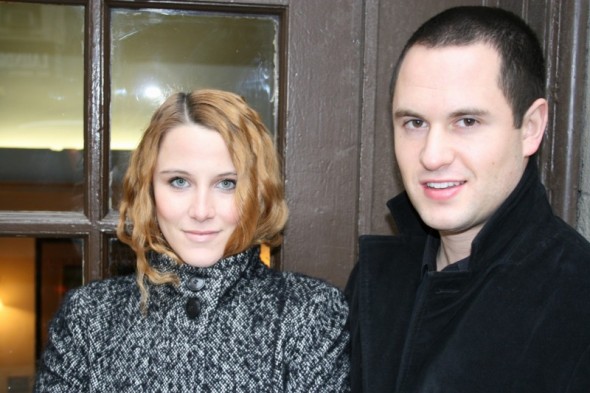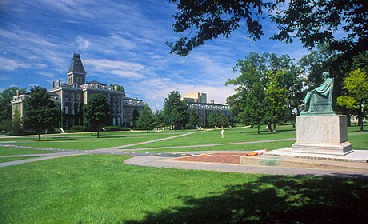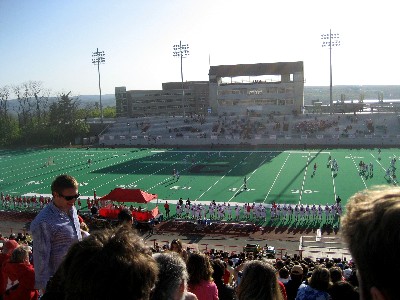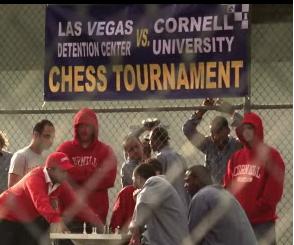 | ||
Archives
|
May 2008
Conservatives at Cornell and Beyond
S.E. Cupp '00 was Daze editor at The Cornell Daily Sun and interned at the Johnson Museum. After the classically trained dancer worked at The New York Times, she enrolled in the master's program at New York University, where she's currently pursuing a degree in religious studies. Brett Joshpe '02 went on to Harvard Law School, where he graduated in 2005. If these Cornellians don't sound like your typical College Republicans, it's because they're not. But both experienced life at the University as self-described conservatives, and now they want to set the record straight. Their new book, Why You're Wrong About the Right, tackles myths and reveals "the surprising truth about conservatives." Intrigued, MetaEzra sat down virtually with the authors to discuss how their Cornell years formed their worldviews today.  So, be honest: Did you land on campus a fully formed conservative, or were you once a bright-eyed, idealistic young liberal who eventually became hardened by the radical excesses of Cornell's students and faculty? SEC: I came to Cornell like most 18-year-olds I think ... less interested in politics, per se, and more interested in "big ideas." So I'd say most of my "big ideas" at the time would probably have been classified as liberal, though I'd always been a law-and-order, eye-for-an-eye kind of gal. But my sophomore year I attended a debate between then-government prof Jeremy Rabkin, a known rebel conservative, and some visiting professor from another institution about affirmative action. [Editor's note: Rabkin departed for George Mason last year, drawn by the lure of a salary increase and more responsibility. You can read MetaEzra's chat with him here.] I found myself so aligned with Rabkin's position, and energized by his enthusiasm, it prompted me to do a little research. I figured, "if this is what it means to be conservative, maybe I'm a Republican." In a very short time I fast-tracked my political education on my own, and by the time I left I was a staunch Republican. BJ: I arrived an unapologetic Republican. I was never an idealistic liberal. My idealism was always somewhat limited to the expectations I set for myself individually as a person. Despite being a Republican from day one, my politics certainly shifted Right as my education progressed through my Cornell years and into law school. When I began college, I would have described myself as a "moderate Republican." Several things, however, pushed me further right: the events of 9/11 and aftermath, a legal education that revealed the logic of conservative reasoning, fatigue with reactionary liberalism on campus, and finally, a greater appreciation for the world around me and less concern with grades and the opinions of those who gives the grades. Andy Guess | May 30, 2008 (#) After Microsoft Pullout, What's Next for Cornell? As I reported in today's Inside Higher Ed, Microsoft announced last week that it was ending its book-scanning project, which partnered with major research libraries to digitize hundreds of thousands of books and journals. After Google announced its project in late 2004 with high-profile partners including the New York Public Library and the University of Michigan, Microsoft stepped in with Cornell, Johns Hopkins and a few others. What distinguished that project, which was otherwise quite similar to Google's, was the agreement with the Open Content Alliance to keep all scanned materials (in theory permanently) at the nonprofit Internet Archive. Where does that leave Cornell? As it turns out, the University announced a complementary partnership last year with Google, slated to begin with Mann Library's holdings in the life and biological sciences. That seems to have been a stroke of luck -- Cornell hedging its bets to work with both major corporate competitors. For now, Cornell's most likely option is to ramp up its partnership with Google. Otherwise, it could consider a direct relationship with OCA, although that alliance will be looking for new sources of funding -- a disadvantage the corporate efforts didn't have. The initial Microsoft contract was already set to conclude in two months, Kenney said, and the university likely would have pursued a renewal had the project not ended. So far, between 90,000 and 100,000 volumes have been scanned through the program, she said, mainly pre-1923 monographs, in English, “across the subject spectrum.” To get a sense of the scale, the partners scanned more books in the first four months than in the previous 15 years, before Microsoft signed on. “We felt very positively about our relationship with Microsoft,” Kenney said, adding that “the scanning was of extremely high caliber ... they were very responsive to our needs.” But she noted that Microsoft’s announcement has sharpened considerations among research libraries of “ongoing preservation” efforts, the “long-term interest in preserving cultural heritage materials respective of their commercial value” — for centuries, as opposed to decades or years in the life span of the typical company. Andy Guess | May 30, 2008 (#) Chancellor Martin! Biddy Martin has accepted the offer for the UW-Madison chancellorship. Not to toot our own horn too much... but we did say there was a seventy to eighty percent chance of this happening. UPDATE: David Skorton has issued the following statement to the press: "On a personal note, I am delighted for Biddy and I look forward to continuing our partnership at the national level. "Turning to the future, I will soon begin a process to identify suitable candidates for consideration as the next provost of Cornell University. I will share with the community additional information on the search process after I have conferred with my colleagues on the faculty and others across campus." And the University of Wisconsin has issued a statement of their own: “In her years at Cornell, Dr. Martin has established a reputation for strong, effective and strategic leadership,” said Reilly. “As the provost of New York’s land-grant research university, she has wide-ranging experience with all of the roles UW-Madison must play in the life of this state, the nation and the world. She is someone who appreciates fully the importance of education to the future of American society, and conveys that message to others with a high degree of passion and credibility.” Of course, relative to Upstate New York, Wisconsin's economy is a bona fide success story. We've been hearing from a lot of readers lately on this exciting career opportunity for Biddy. And we love to hear from you. Whether or not you are a student, alumnus, faculty, or staff, please feel free to get in touch with us. Are you sad to see Biddy go? Happy for Biddy's career? Or excited for future change at Cornell? Matthew Nagowski | May 28, 2008 (#) A Consumate (Future) Cornellian The New York Sun is running an article on 2008 graduates of the CUNY system. One of the students is transferring to Cornell after earning his associates degree: Raised in Ghana, Mr. Wallace, 22, worked the overnight shift as a security guard during much of his time at Bronx Community College, where he maintained a 4.0 average in liberal arts and is the class valedictorian. After his midnight to 8 a.m. shift, Mr. Wallace would stop briefly at home before heading to class. "There were definitely times when from Sunday to Tuesday I didn't have time to sleep," he said. Mr. Wallace moved to New York in 2006 to live with his father, a taxi driver, who had arrived from West Africa nearly two decades earlier. His mother stayed behind. "The whole idea is to have a better chance of success here," he said. Next, Mr. Wallace plans to attend Cornell University to pursue a bachelor's degree. From there, his goal is medical school and training in neurosurgery. "I've always known I wanted to study science," he said. "Where I come from, doctors are more of a scarcity than a commodity," he said. "I think there's a real need." A great story for anybody who questions why Cornell accepts transfer students or students from community colleges. Matthew Nagowski | May 27, 2008 (#) Congratulations to the Class of 2008! The view of a full Crescent is awe-inspiring. The Sun adds their coverage here.  A.R. Ammonss 'Saltue', from an old (but good!) Hunter Rawlings Commencement address: May happiness catch you a clearing Matthew Nagowski | May 25, 2008 (#) More Speculation on Biddy Amidst the pomp and circumstance of Cornell's 140th Commencement exercises, we've been receiving some correspondence about the prospects of the Wisconsin Chancellorship for Biddy Martin. They tend to agree that Biddy may be the strongest candidate for the job, but that other considerations must be factored into the dialog. Below, I share some of the thinking on the issue: An alumnus from the sixties considers the following questions: While a recent alumnus from Wisconsin offers the following: And one recent alumnus writes: And then there is the conventional wisdom coming out of Madison, which suggests that either (Dean of Michigan's Ford School) Rebecca Blank or Biddy are the best poised for the job. Blank has a lot of connections to the Washington D.C. establishment, so she has a lot in her favor. Wisconsin is currently expected to announce their new chancellor sometime this week. All things to mull over this weekend as we enjoy our Memorial Day barbecues and $4 gallons of gasoline. Matthew Nagowski | May 25, 2008 (#) Sparsing the Strategic Plan Last week the University released it's strategic plan to "position Cornell as a leader in the 21st century". It's filled with a lot of nebulous wishes, but also some explicit goals. After MetaEzra finishes digesting all of these wonderful talking points, Andy and I are going to plan on releasing our own strategic vision for Cornell. Expect it to be bold and a bit ambitious. While it's rather long, and MetaEzra encourages all interested parties to read it in full, we have pulled out some choice quotes on themes and issues that are near and dear to our heart. Enjoy! Public support of higher education The costs of higher education continue to rise to support innovative education, research, and scholarship, which require state-of-the-art facilities, robust infrastructure, competitive salaries, and more services and amenities for students. As a percent of total expenditures, the government's share has failed to keep pace with costs; universities are, therefore, increasingly dependent on private funding and on tuition, over which they have considerable control. As is true for other institutions of higher education, Cornell must seek new revenue sources to avoid unsustainable tuition increases and/or limits to student access and to faculty and student achievement. Nurture relationships with New York State and SUNY to serve Cornell's interests and those of higher education and economic prosperity in the state. Role in Upstate New York The university can be an even better partner in community and economic development in upstate New York. Similarly, maintaining the unique quality of our programs requires consistent and predictable support from partnering state and local agencies. In partnership with the local community, ensure that Ithaca remains a vibrant place to live and work, with emphasis on affordable housing and accessible transportation for faculty, staff, and students. Take advantage of Cornell's unique role in New York State and beyond and seek new ways to link research advances with economic development through technology transfer, business start-ups, corporate relations, investments in the community, and consultation with community leaders and government officials. Maximize the opportunity of a new state administration to enhance Cornell's relationship with the state and with key political figures and solidify Cornell as a New York State higher education leader in research, outreach, instruction, and public policy development. Pre-professionalism on campus Public demand to prepare undergrduates to enter the job market with defined skills has created a need to provide pre-professional education in the curriculum that competes with the traditions of a liberal arts education, especially in exposure to the humanities and arts. Work with college deans (and, when appropriate, external evaluators) on regular and substantial curricular review of every academic department and program and careful study of teaching requirements, teaching loads, and the evaluation of teaching. Rankings Place 25 fields in the top ten National Research Council (NRC) rankings by 2015, while placing every professional school in the top ten in its relevant ranking. (In the 1995 NRC rankings, 19 graduate fields ranked in the top ten. Four of our professional schools or programs currently rank first or second.) Matthew Nagowski | May 23, 2008 (#) What Olin Should Look Like: A Counter-Post Instead of trying to imitate the gorgeous Seattle Public Library, Cornell should return to its roots in building a much-needed new facade to replace the Midwestern stinginess (sorry, "functionalism") of the current Olin Library. My modest proposal:  What better way to celebrate the Arts Quad (and Cornell's Quaker heritage) than to transform Olin into a giant mirror reflecting the beauty and diversity of the existing campus? Modern and forward-looking while mindful of the University's heritage: Is there a better architectural metaphor for a Cornell education? (Plus, no Photoshop required!) Andy Guess | May 22, 2008 (#) Olin's New Facade Yesterday, we saw that Olin Library may be getting a new facade. Today we propose what is should look like: A glass and and aluminum atrium with panoramic views of the Slope and Arts Quad on the lower floors. Additional faculty offices and graduate carrels can be built around said atrium. Like this:  So a mix of Koolhaas's Seattle Public Library and whatever Liebeskind is doing these days seems like a safe bet. My apologies to architects and graphic designers everywhere. On a more serious note, unlike most other Cornellians, I was never bothered by Olin's aesthete on campus. It served its purpose proudly: A hulking mass of concrete and books, echoing the libraries of many of the Midwestern state schools. Whenever somebody would complain about Olin, I would just claim that Cornell had the best of both worlds -- the arts quad of a private northeast college and the big research library of a Midwestern university. My only wish is that the color of the building was more of a darker sandstone or brownstone than today's pasty-white rusting concrete. Olin Library is actually a place very near and dear to my heart. My first job at Cornell was manning the circulation desk at Olin, under the wonderful guidance of Carol Buckley. And I spent an inordinate amount of time in the basement of Olin my senior year, conducting data entry from musty old volumes for my senior thesis. Matthew Nagowski | May 21, 2008 (#) Cornell Faculty Affirm: A Cornell Degree Must Be Earned The issue of whether or not Weill Cornell would be able to award honorary degrees was brought to the Faculty Senate for a vote yesterday. The Cornell Alumni Magazine broke the decision with their exclusive story today: In a memo, Hajjar and two colleagues wrote: “Such a honoris causa ad gradum would enable us to recognize outstanding intellectual achievements, creative accomplishments, and leadership in education, public service, medical ethics, or other appropriate sectors of society, both nationally and internationally. We view this goal as consonant with the fundamental mission of the University.” But many Ithaca faculty disagreed, arguing that the criteria for selection were too broad and the process potentially open to abuse; they also noted that Cornell’s refusal to grant honorary degrees is a longstanding tradition beloved by some alumni. In the past, some faculty have expressed suspicion that the driving force behind the change is the desire for a fundraising tool. Says neurobiology and behavior professor Howard Howland: “The tradition of not awarding honorary degrees is an old and venerable one, but as useful as ever in insuring that honorary degrees should not devalue the University’s earned degrees.” A full copy of Hajjar's letter may be found here. The most interesting sentence asserts that, "The University should be careful that the awarding of a degree not be political motivated or appear to be so." So one would hope that Weill Cornell never intended to honor wealthy benefactors with such a degree... even if they are the Emir of Qatar or the the former Chairman of Citigroup. But we have our suspicions. This may not be the last time we hear about this issue. Matthew Nagowski | May 15, 2008 (#) More 2008 Waitlist News So as our nice follow-up to the story that Cornell does not look to be taking many students off the waitlist... yet, the Undergraduate Admissions Office sent out the following email to all waitlisted students yesterday: Thank you for your continued interest in Cornell University. Since you have elected to remain on our waiting list, I am writing to provide you with an update. As of today, we have made a limited number of offers of admission from the waiting list for our School of Hotel Administration. Although there is still a possibility that we may extend offers of admission for Cornell's other colleges and schools, we are not prepared to do so at this time. We should have another update for you during the week of May 26, or you may hear from us sooner if we are able to extend an offer of admission to you. With best regards, Jason C. Locke So, as we suspected, it's really going to hinge on how many currently enrolled students at Cornell get off the waitlist from other schools and decide to attend those schools instead. If this doesn't happen, it would be the first year in three years that Cornell hasn't had to aggressively use the waitlist. Matthew Nagowski | May 15, 2008 (#) Putting The Odds on a Chancellorship So the Wisconsin press is just full of gushing articles about Biddy Martin, and her consideration for the UW-Madison chancellorship. And Biddy is just gushing in return: We have to assume that if Biddy is given the opportunity, she will take it. So what's the possibility that she is selected? There are three other candidates, so one might think that the probability might be one in four. But we're going to go out on a limb and put the odds that Biddy leaves Cornell for Wisconsin at closer to 70 to 80 percent. Simply put, Biddy is the most qualified for the job. None of the other three candidates have managed the day to day operations of a large research university for the last eight years. But Biddy has, and she has done a pretty admirable job during her tenure at Cornell. Either way, we'll know by early June. So let's assume that Biddy gets the job. How does that affect Cornell? The capital campaign? And Biddy's various initiatives? For the time being, we think David Harris will be named interim provost. After all, he's been the deputy provost for close to a year now. But then it will be interesting to see who the next provost will be. If the last two provosts of Cornell have gone on to the top spots at the University of Chicago and the University of Wisconsin, there's no denying the fact that the provost position at Cornell is highly coveted within the ivy-coated walls of academia. Matthew Nagowski | May 14, 2008 (#) Waitlist Woes The whispers we have been hearing out of the Cornell admissions offices is that the various colleges mostly met their yield targets, and that only certain schools -- like the Hotel School -- are turning to the waitlist. Last year, Cornell accepted nearly 10 percent of its entering class out of the waitlist. But we're not holding our breadth: "This year has been less predictable than any recent year," said Eric J. Kaplan, interim dean of admissions at Penn, adding that when one college in the top tier goes deep into its wait list, others are affected. "We all need to fill our classes and replace students who have been taken off wait lists at other institutions. The wait-list activity could extend for a significant time." Although colleges turn to wait lists to fill out their classes, it is unusual for the most selective to go so deep, college officials say. The implications are clear: Even if Cornell has met its enrollment targets for the time being, the aggressive use of waitlists at certain institutions known for winning the common-admit battle with Cornell (e.g. Harvard, Princeton), may mean that Cornell may see the number of committed students dropping, possibly forcing Cornell itself to turn to the waitlist. It's similar to trickle down effect on the economy popularized by Republican Presidential candidates, except, you know, in this setting it actually has an effect. Of course, financial considerations aside, why somebody wouldn't want to spend four years in Ithaca, NY is beyond me. The can live in cities like Boston for the rest of their life. Matthew Nagowski | May 13, 2008 (#) Coming Soon: A Free Cornell Magazine? No, the University hasn't suddenly given the Cornell Alumni Federation and the Cornell Alumni Magazine the money that is needed to circulate their magazine free to all Cornell alumni. But it may be the next best thin, as the gray lady reports: Mr. Kim will stay as publisher. Tom Allon, president and chief executive of Manhattan Media, said he hoped the executive editor, Richard Bradley, would also stay. The magazine will go from four issues a year to six, he said. “We plan to launch a companion Web site that’s a social networking Web site for Harvard alumni, and sponsor a series of events, alumni events, around the 02138 brand,” he said. “We think this is a sort of new paradigm in publishing. I think people do share common interests when they’re alumni of a university.” Over the next few years, Mr. Allon said, “Our plan is that this is the first of what will become eight Ivy League magazines, sites and events companies,” one each for Brown, Columbia, Cornell, Dartmouth, Penn, Princeton and Yale. Though he is an alumnus of Cornell and Columbia, Mr. Allon said the next project would probably be Yale or Princeton. The magazine, mailed free to about 100,000 Harvard alumni, is supported by ads, and the other magazines would follow that lead. “Paid circulation, I think, is a dying model,” [Allon] said. Tom Allon received his A.B. from Cornell in 1984. It will be interesting to see how this all plays out. First, I don't think Cornell alums navel gaze nearly as much as some of their Ivy peers. Let's face it: a plant botanist or materials science engineer probably won't be very interested in how alums are dressed in California. Secondly, it will create some competition for the present Alumni Magazine, as well as for the Daily Sun, and blogs like this one. But if you ask us, competition is always a good thing. So is more people writing about Cornell. And the fact that it will be free and distributed to all alums is just icing on the cake. Also, any guesses on what they will name the Cornell-centric magazine? I hope they don't go with 14853. After all, there already is a magazine called 14850. Let's hope they go for something with a nice Cornelliana ring to it. But remember, "Far Beyond Cayuga's Waters" is already taken. Matthew Nagowski | May 12, 2008 (#) The View From The Crescent MetaEzra made a pilgrimage to Ithaca -- our darling Ithaca -- yesterday. Over the course of the day we connected with old friends and new, soaked in some facetime at CTB, dined on The Commons, indulged ourselves at the Cayuga Lake Creamery, and enjoyed the first round of the NCAA lacrosse tournament with a game between Cornell and The Ohio State University. Loyal readers, no doubt, will recall that last year MetaEzra followed the lacrosse team in carnelian and white all the way to Baltimore. That said, we would rather not talk about yesterday's lacrosse game. Suffice to say that we think Duke will have its hands full against the Buckeyes next week. We're also hoping that Cornell senior and lacrosse player Danny Nathan, who has been blogging for the NYTimes this week, will be able to fill us in on exactly what happened out on the field. But this was the first time that we ever took in a game at Schoellkopf amidst such bona fide  Complete with tailgating on Kite Hill before the event, we began to get the feeling of what Stanford would be like. Matthew Nagowski | May 11, 2008 (#) Fictionalized Cornell In last week's CSI episode on CBS, a chess tournament between the Cornell University Chess Club and the Las Vegas Detention Center was featured prominently, with over a minute of air time dedicated to a Cornell student check-mating an inmate. The relevant scene can be found at 9:13 of this clip. Here's a screen shot:  Why in the world would Cornell students be playing chess in Nevada? Well, some alums might have something to do with it. At least the Cornell Image Committee should be happy, as "cool hoodies" were featured prominently. This clip ties in nicely with a recent article in the Alumni Magazine about fictionalized Cornell and Cornellians. The article showcased a lot of fictional Cornellians in a positive light, but also explored the phenomena of negative Cornell images in the media: But Cornell-educated protagonists seem to be matched in nearly equal numbers by less desirable characters. For every Gabrielle Ashe (a U.S. Senator's aide who courageously ends her corrupt boss's career in Dan Brown's thriller Deception Point), there is a Bobby Earl (a rapist and murderer played by Blair Under-wood in the movie Just Cause). For every Eric Erickson, a Swedish industrialist who masquerades as a Nazi sympathizer to spy on the Germans during World War II in Alexander Klein's 1958 novel The Counterfeit Traitor (William Holden played him in the movie), there is a Taro Seki, a Japanese engineering grad who grew to love America while in Ithaca but changes his tune upon joining the Japanese army during that same war (in the propaganda film Behind the Rising Sun)... Personally, I always have suspected that characters like Andy Bernard or Sideshow Mel are just pranks being played on Cornell by screenwriters who happen to have graduated from other Ivy League schools... namely Harvard. After all, Harvard has a reputation for producing a lot of Hollywood screenwriters for shows like The Office or The Simpsons. But it is nice to know that Cornell screenwriters are looking out for their alma mater too... by having the chess club beat a bunch of Las Vegas prisoners. Now they just need to start taking pot shots at Harvard. Matthew Nagowski | May 08, 2008 (#) Goodbye Biddy? It's of course too early to say our goodbyes just yet, as Biddy is just a finalist, and has not yet actually been chosen as the Chancellor for UW-Madison, but I have to imagine she may be considered the leading contender for the position in many circles. After all, she is widely respected in academia, credited for wrestling Cornell's suffering bureaucracy to the ground and implementing a lot cross-disciplinary initiatives, and was The breaking news out of the Badger State today: The candidates are: Gary Sandefur, dean of UW-Madison's College of Letters and Sciences; Biddy (Carolyn) Martin, Provost of Cornell University in New York; R. Timothy Mulcahy, vice president for research at the University of Minnesota; and Rebecca Blank, former dean of the Gerald R. Ford School of Public Policy at the University of Michigan. Of course, Biddy completed her PhD in German literature in 1985 from the University of Wisconsin–Madison, so this would be a homecoming for her. Late Thought: Did Biddy actually see this coming by naming a Deputy Provost last year? Probably not, but it would help to ease the transition. Matthew Nagowski | May 07, 2008 (#) The Enduring Value of a Cornell Degree Forget about all of the Cornell Career Services propaganda, you don't have to look any further than this very website to see how far a degree from Cornell University can take you. You see, now three years out from earning our degrees (and only two years away from our first reunion!), Andy and myself have reached the pinnacle of professional and personal success: But I suppose it could be worse. After all, we could be Kevin Vanginderen ’83 who is inexplicably and frivolously suing the University for something as innocuous as offering digital archives of the Cornell Chronicle. (Here's a hint, Kevin, if you are trying to protect your past, don't commit actions that are going to make you even more Googleable.) Or, we could always be Ann "poll tax" Coulter '84. *I'll concede that we are at least still gainfully employed and both have rather legitimate reasons to be living with our parents. Matthew Nagowski | May 05, 2008 (#) Faithful No More? Mitchell Alva and Elie Blimes penned a much needed op-ed in today's Sun regarding the University's treatment of the Lynah Faithful in recent years: As Cornell has missed the NCAA tournament each of the last two years, a supportive, vocal fan base is more valuable than ever — we suggest several policy changes for the upcoming season to revive that fan base. First, we need to improve the ticket lottery system. As it stands, there is no mechanism to ensure that the most dedicated fans have an opportunity to receive tickets. A return to general admission seating would improve the Lynah atmosphere, as the most dedicated fans who arrive earliest could sit wherever they please amongst student seats. We would also love to see Athletics organize bus trips. These exciting journeys would provide an easy opportunity for students without cars to see the team on the road and would cultivate a new generation of devoted Lynah Faithful.... As dedicated fans, we have spent considerable time, money and effort following Cornell hockey, and it isn’t too much to ask that our efforts be appreciated... For many of us, hockey is a highlight of our Cornell experience. Please don’t ruin it. I suspect that one of the reasons for the high price of hockey tickets was the 2005 renovation of Lynah Rink, in order to make the Cornell facilities more attractive to Schaefer's recruits. But even so, I don't think a college hockey game should cost more than a movie at the local cinemas. But more generally, the University should be doing everything in its power to make the student athletics experience positive, not negative. The current hockey ticket lottery is ridiculous in this regard, as it does nothing to reward those who really make Cornell hockey what it is -- the Lynah Faithful. Is the University really too scared to simply say: "Tickets go on sale at 6PM on Sunday. Please get in line when you wish?" Start to assign line numbers at 6PM the day before, and have random number checks throughout the 24 hour period. Any line issues before that time should be student regulated -- perhaps by the Pep Band? I doubt anybody would show up before Friday night, and that would certainly be the most equitable, safe, and exciting way to dole out tickets, especially considering they are already making the students sleep overnight in Bartels. Might as well make it worth something. I'm more torn about the busing. Ideally, Athletics doesn't really need to be involved. I'm certain some intrepid student group or fraternity could do the leg work to organize bus trips to the Harvard or Princeton games. And I bet they could even get funding from it at the SAFC. Matthew Nagowski | May 01, 2008 (#) |
-- WSJ: Cornell Wins NYC Tech Campus Bid (EBilmes) -- Barrier Update: City Approves Nets (DJost) -- Big Red Cymbal Guy (Nagowski) -- New York Times Survey on Campus Recruiting is Flawed (KScott) -- Barrier Update: Legal precedent suggests City of Ithaca will not be held liable for gorge suicide (DJost) -- Despite MSG Loss, Big Potential for Big Red Hockey (EBilmes) -- City Council Will Vote on Suicide Nets (DJost) -- An Encounter on the Upper East Side (Nagowski) -- Showing Off Your School Spirit (Nagowski) -- Chipotle Ithaca? (KScott) -- Cornell at the ING NYC Marathon (KScott) -- Crossing Over a Fine Line: Commercial Activity on Campus (KScott) -- Milstein's Downfall (Nagowski) -- Can any Cornell-associated organization really be independent of the University? (Nagowski) -- Slope Media Revisited (EBilmes) -- Slope Media Group Approved for Byline Funding (KScott) -- Occupy AEM? (KScott) -- New campus pub to be good for both Greeks and non-Greeks (Nagowski) -- Gagging the Election (Nagowski) -- The Changing Structure of Rush Week (Nagowski) -- Ivy League Humility in the Midwest (EBilmes) -- Of Median Grades and Economics Minors (Nagowski) -- Homecoming Recap (Nagowski) -- My Cornell Bookshelf (Nagowski) -- The Sun's Opinion Section Has Suddenly Gotten Good (Nagowski) -- Remembering the 11th (Nagowski) -- Cornellian Tapped as Top Economic Advisor (Nagowski) -- Cutting Pledging, and the Good Which Comes With It (EBilmes) -- Why Cornell Should Not Close Fall Creek Gorge (Nagowski) -- Welcome to the Class of 2015 (Nagowski)  |